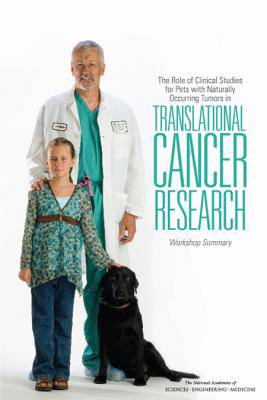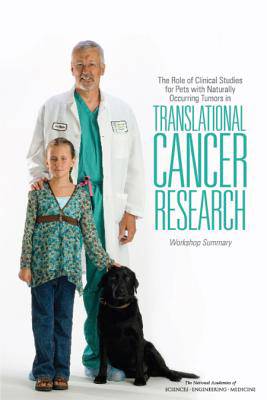
- Afhalen na 1 uur in een winkel met voorraad
- Gratis thuislevering in België vanaf € 30
- Ruim aanbod met 7 miljoen producten
- Afhalen na 1 uur in een winkel met voorraad
- Gratis thuislevering in België vanaf € 30
- Ruim aanbod met 7 miljoen producten
The Role of Clinical Studies for Pets with Naturally Occurring Tumors in Translational Cancer Research
Workshop Summary
National Academies of Sciences Engineering and Medicine, Institute of Medicine, Board on Health Care Services, National Cancer Policy ForumOmschrijving
Traditional preclinical mouse models of cancer have been very useful for studying the biology of cancer, however they often lack key characteristics of human cancers. As a result, many novel drug candidates fail in human clinical trials despite evidence of drug efficacy in those preclinical models. Thus, researchers are seeking new approaches to augment preclinical knowledge before undertaking clinical trials for human patients.
Recently, there has been renewed interest in comparative oncology - the study of naturally developing cancers in animals as models for human disease - as one way to improve cancer drug development and reduce attrition of investigational agents. Tumors that spontaneously develop in pet dogs and other companion animals as a result of normal aging share many characteristics with human cancers, such as histological appearance, tumor genetics, biological behavior, molecular targets, and therapeutic response.
In June 2015 the Institute of Medicine hosted a workshop to examine the rationale and potential for integrating clinical trials for pet patients with naturally occurring cancers into translational cancer research and development. Participants discussed the research needs, strategies, and resources to support greater integration of clinical trials for pets with cancer into translational research pathways, and challenges and potential solutions for facilitating that integration. This report summarizes the presentations and discussions from the workshop.
Specificaties
Betrokkenen
- Auteur(s):
- Uitgeverij:
Inhoud
- Aantal bladzijden:
- 82
- Taal:
- Engels
Eigenschappen
- Productcode (EAN):
- 9780309379908
- Verschijningsdatum:
- 9/01/2016
- Uitvoering:
- Paperback
- Formaat:
- Trade paperback (VS)
- Afmetingen:
- 152 mm x 229 mm
- Gewicht:
- 301 g

Alleen bij Standaard Boekhandel
Beoordelingen
We publiceren alleen reviews die voldoen aan de voorwaarden voor reviews. Bekijk onze voorwaarden voor reviews.









